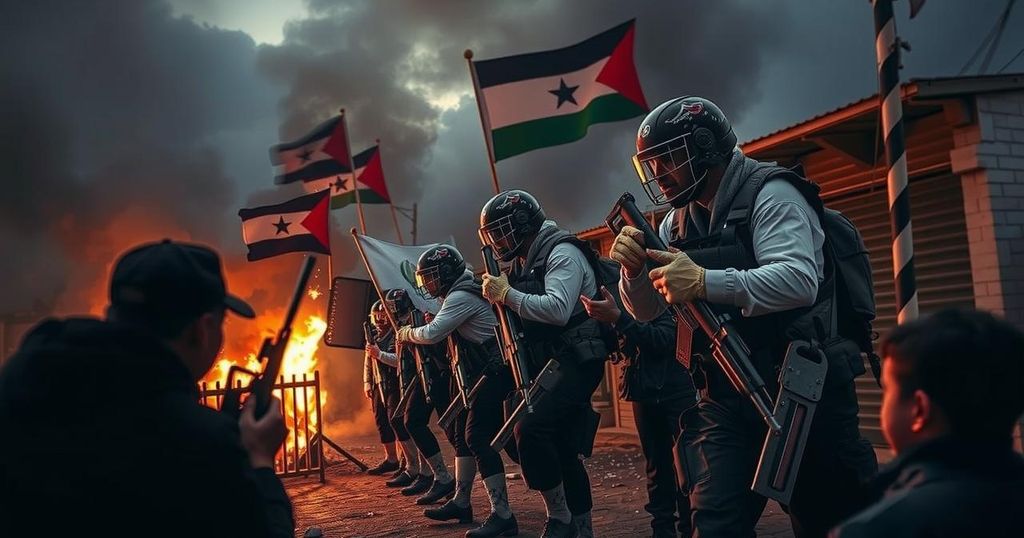The Assassination of Yahya Sinwar: Implications for the Gaza Conflict and Israeli Politics
The assassination of Yahya Sinwar, leader of Hamas, is likely to embolden Israeli Prime Minister Netanyahu’s military strategy in Gaza. This event underscores a significant shift in the geopolitical landscape, diminishing prospects for negotiations regarding hostages and ceasefire. Increasing internal extremism within Israeli politics complicates the situation further, as Netanyahu navigates pressures from multiple factions. The outcomes of this assassination could lead to reshaping alliances and realizing military goals, while future actions may hinge on public sentiment and the dynamic of international relations, particularly with Iran.
The assassination of Yahya Sinwar, leader of Hamas’s political bureau, marks a pivotal moment in the ongoing conflict in Gaza. This event may solidify Israel’s military stance, as there is a noticeable absence of potent leadership within Hamas capable of pursuing negotiations surrounding hostages or a ceasefire. The geopolitical landscape is shifting, as this incident bolsters Israeli Prime Minister Benjamin Netanyahu’s position domestically and allows him to address external threats, particularly those perceived to be part of a broader coalition against Israel, including Hezbollah and potentially Iranian interests. The elimination of Sinwar, a key figure since the October 7 events, follows a similar fate for other high-profile leaders such as Hassan Nasrallah and Ismail Haniyeh, leaving a vacated leadership structure in both Hamas and Hezbollah. This shift is predicted to radically alter political dynamics within the Gaza Strip and Lebanon, reinforcing Netanyahu’s confidence in his hardline approach. As the possibility of negotiations diminishes, all eyes are on Netanyahu’s next strategic move. Anticipation now surrounds Netanyahu’s potential plans, which may aim for the neutralization of remaining threats, including those posed by Iran and Hezbollah, well before the upcoming U.S. elections in November 2024. Although there may be opportunities for discussing hostages and a reestablished Palestinian Authority, the urgency dictated by international relations and imminent military objectives takes precedence in his agenda. Israel’s internal policies appear increasingly complex and influenced by deep-rooted religious and political factionalism that escalates regional conflicts. By recognizing that sustaining conflict is essential for the flow of military and economic support, Israeli political leaders have embodied a mindset that prioritizes war as a tool for survival. The rise of Netanyahu since 1996, against a backdrop of increased extremism in Israeli politics post-assassination of former Prime Minister Yitzhak Rabin, demonstrates the evolving political landscape. Netanyahu’s coalition balances between different factions, including right-wing, far-right, and a newly emerging moderate right. This configuration enables him to navigate foreign policy effectively while maintaining domestic support despite potential missteps. The flexible right’s role within Israel’s political arena cannot be overstated. This group, which originally supported Netanyahu, has developed a more aggressive and nationalistic agenda that resonates strongly with a significant portion of the electorates. The dynamics of recent electoral systems have dramatically shifted power, leading to a complex interplay between traditional ideologies and the evolving political climate. In response to crises, Netanyahu has strategically used the media to consolidate power, garnering support through nationalist rhetoric. The upcoming Israeli actions against Hezbollah and Iran may reflect a desperate grasp for public approval rather than a coherent strategy. Should the threat of conflict escalate, the very support that Netanyahu has cultivated may begin to erode, compelling him to reassess his political maneuvers.
The context for the assassination of Yahya Sinwar resides within a prolonged and multifaceted conflict involving Israel and Palestinian factions, particularly Hamas. The past few months have witnessed heightened tensions following the October 7 attacks, which shaped public perceptions and led to a decisive shift in Israeli military strategy. As Israel pursues a hardline approach against perceived enemies while navigating complex internal political dynamics, the elimination of key leaders like Sinwar signals potential changes in the operational capabilities and political structure of Hamas and Hezbollah. The balancing act within Israeli politics, especially as elections loom and external pressures from entities like Iran rise, adds a layer of urgency to the Israeli government’s strategic decisions.
In summary, Yahya Sinwar’s assassination could represent a critical turning point in the Gaza conflict, potentially justifying an intensified approach by Israel against both Hamas and associated threats. Netanyahu’s strategy appears to be focused on maximizing military objectives while navigating the intricate landscape of local and international politics. The diminishing prospects for dialogue, coupled with an escalation of militaristic ambitions, indicate that the region’s future remains precarious. As internal political alliances continue to shift, the long-term ramifications of these events could define the trajectory of both Israeli and Palestinian governance in the coming years. A rational approach towards conflict resolution may indeed hinge on recognizing the opportunities presented by leadership changes within Hamas, urging a reconsideration of aggressive strategies in favor of diplomatic avenues.
Original Source: www.dailynewsegypt.com




Post Comment